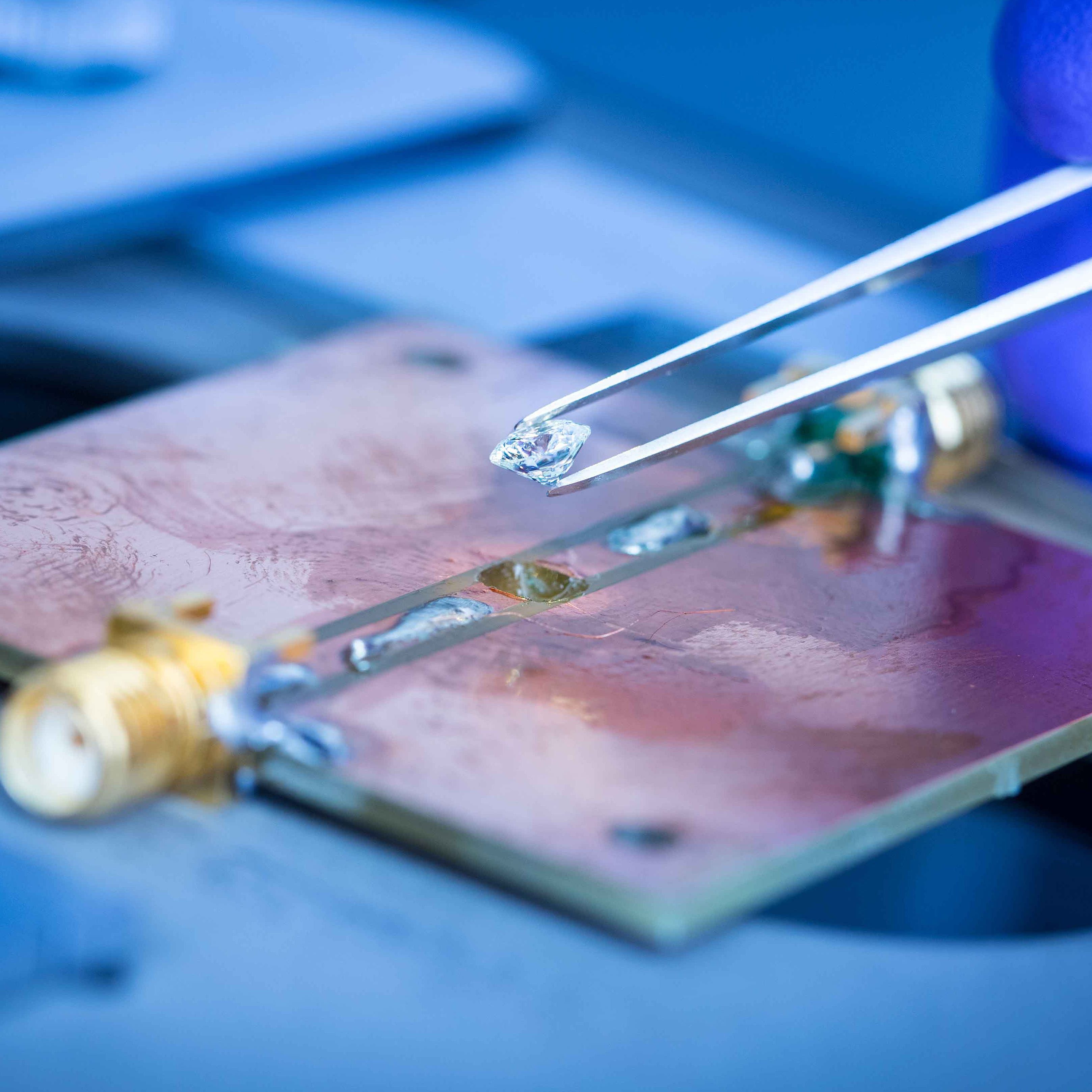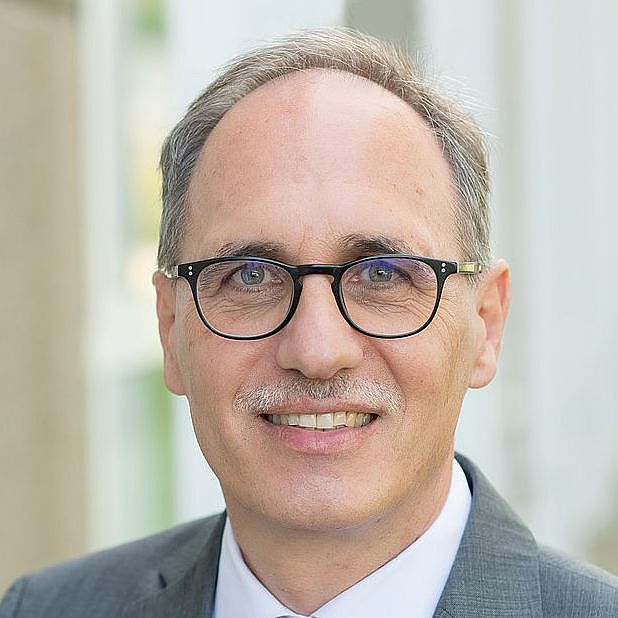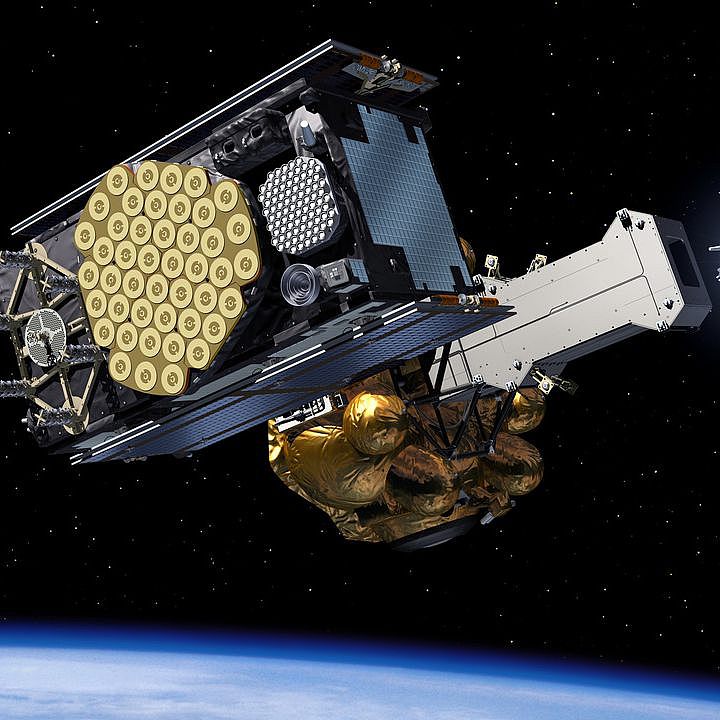- Federal Ministry of Education and Research (BMBF) project QSolid - Quantum computers in the solid state
- Federal Ministry of Education and Research (BMBF) project PhoQuant - Photonic quantum computers
- Federal Ministry of Education and Research (BMBF) project SPINNING - Spin-photon-based quantum computer on a diamond basis
- Federal Ministry of Education and Research (BMBF) project CoGeQ - Competitive German Quantum Computer
- Federal Ministry of Education and Research (BMBF) project DiaQNOS - Quantum Sensing Methods for Neurosurgery
- Federal Ministry of Education and Research (BMBF) project Q-SiCk - Integrated photonics for scalable and CMOS-compatible quantum technologies in silicon carbide
- Federal Ministry of Education and Research (BMBF) project DE-BRILL - German Brilliance: Manufacturing process and novel control techniques for diamond quantum computers

Quantum Science and Technology
The laws of quantum mechanics open up completely new horizons for the development of future technologies. Whether in medical imaging, quantum computing, satellite navigation or information encryption and data security – the fields of application at Ulm University are diverse and the potential for innovation is enormous.
Ulm University – pioneer and partner in quantum research
In the birthplace of Albert Einstein, Ulm University, as a pioneer in quantum research, is working together with research institutions and partners from industry to open up the quantum world for the future. Our researchers are among the world's leading minds in the field of quantum physics. They are working at the highest level to understand and control quantum systems and to utilise their physical properties for new applications.
Our quantum research at a glance
Ulm University is one of the world's leading centres for quantum research. With its interdisciplinary orientation and world-class research at the interface of Physics, Engineering, Information and Life Sciences, it contributes significantly to the development of novel quantum technologies.
These activities are supported by a broadly diversified ecosystem that includes non-university research institutions such as DLR institutes, start-ups and high-tech companies in addition to the University. The Center for Integrated Quantum Science and Technology (IQST) bundles the expertise with the locations in Stuttgart and at KIT. Finally, Ulm is a key partner in national and international alliances, as well as in the state-wide QuantumBW innovation campus.
Quantum research at a top level
The IQST is one of the world's leading centers for quantum technologies. It was founded in 2014 by the Universities of Ulm and Stuttgart and the Max Planck Institute for Solid State Research, with KIT joining in 2024. The mission of this unique alliance in Germany is to research the fundamental properties of complex quantum systems, which are made up of the basic constituents of matter such as atoms, photons and electrons, across disciplinary boundaries. Scientists from the fields of physics, materials science and engineering as well as the information and life sciences conduct research at the IQST.
At the ZQB, more than 100 scientists conduct research at the interface of quantum and life sciences. With the help of quantum-based technologies, high-performance sensors for medical imaging are being developed to observe metabolic processes in real time at the atomic level; a huge step forward for biomedical research and diagnostics. The ZQB also investigates quantum physical processes in biological systems.
A great example of successful technology transfer at the interface of quantum and life sciences is the start-up NVision, which was founded at the university in 2015 and has emerged from the university as well as numerous other companies. The technology developed there makes it possible to use conventional magnetic resonance imaging devices for the visualization of metabolic processes in real time without major conversion effort.
With the help of quantum mechanical polarization effects, the image signals are forced in such a way that cellular processes become visible at a molecular level. This could lead to massive advances in the diagnosis and treatment of people with cancer in the future. NVision delivered the first “Polaris” device for basic research at the beginning of 2025, with the product line for clinical use set to follow at the end of the year.
The company was founded by Ulm quantum physicists Professor Martin Plenio and Professor Fedor Jelezko, Hebrew University of Jerusalem professor Alex Retzker and Dr. Ilai Schwartz. At the time of its foundation, Dr. Schwartz was a PhD student at the Institute for Theoretical Physics at Ulm University, while Professor Retzker was a postdoc at the university before moving to Jerusalem shortly afterwards.

Three locations, one Cluster of Excellence application
The three locations Karlsruhe, Ulm and Stuttgart combine globally unique expertise in the field of quantum science. The Karlsruhe Institute of Technology, Ulm University and the University of Stuttgart have jointly submitted the “Chem4Quant” proposal in the current round of calls for a “Cluster of Excellence” in the German federal and state governments' Excellence Strategy. Even though the application was not successful in this round, it highlights the excellent research achievements of the scientists involved in recent years and provides important impulses for future developments in quantum technologies.
Draft proposal "Chem4Quant"
Double funding for success
The quantum physicists Professor Martin Plenio and Professor Fedor Jelezko from Ulm have achieved an extraordinary success: They have received two ERC Synergy Grant from the European Research Council (ERC) – the European Union's most highly endowed funding format for outstanding, innovative and high-risk science.
Science at the highest level


Competence network QTBW – Networking quantum technology in Baden-Württemberg
As network partners in the Baden-Württemberg Quantum Technology Competence Network (QTBW), our scientists are contributing significantly to establish Baden-Württemberg as a leading international hub for quantum technologies. Launched in 2019 and supported by the Baden-Württemberg Foundation, the QTBW network combines the expertise of leading research institutions in the region.
Excellence through collaboration
Accelerating the use of quantum technology
From precise navigation and advanced imaging to powerful computers: our researchers are improving new technologies in quantum research and are focussing on close collaboration between science and industry. Together with reinforced partners, we are creating a network that brings research into practice faster.
QSens – Quantum sensors of the future
In the QSens future cluster of the University of Stuttgart and Ulm University, scientists, companies and start-ups are successfully researching innovative quantum sensors and their transfer into practice. These harbour promising potential for healthcare, the Internet of Things and renewable energies, for example. The Federal Ministry of Education and Research (BMBF) has been funding QSens as part of the Clusters4Future competition since 2021.

With QuantumBW, we want to take the final leap into the technology of the future.
Prof. Joachim Ankerhold
Institute of Complex Quantum Systems and QuantumBW spokeperson for science
QuantumBW – Quantum ecosystem for the technologies of the future
Ulm University is part of a dynamic quantum ecosystem that has developed in Baden-Württemberg. In order to reinforce this ecosystem and bring research in the field of quantum technology into use more quickly, the state of Baden-Württemberg launched the QuantumBW innovation offensive in spring 2023.
The innovation offensive QuantumBW
The Carl Zeiss Foundation Center for Quantum Photonics (QPhoton)
Two key technologies, one platform, anchored in Jena, Stuttgart and Ulm: the Carl Zeiss Foundation Centre for Quantum Photonics (QPhoton) is unique in Germany. Opened in 2022, the centre combines the disciplines of quantum technology and photonics at the three excellent research locations of Jena, Stuttgart and Ulm.
Unique centre for quantum photonics

Into the future with quantum technologies: DLR-QT and the Quantum Computing Initiative in Ulm
The research landscape in Ulm's Science City makes a significant contribution to the further development of space travel. Through close cooperation with the German Aerospace Center (DLR), quantum technologies are being developed at the highest level that are revolutionising more than just space travel. The Institute of Quantum Technologies (DLR-QT), founded in 2018, and the DLR Quantum Computing Initiative (DLR-QCI) are pioneers in the field of quantum research and applications.
The dynamic growth of the quantum ecosystem in Ulm's city of science makes Ulm an attractive location for top researchers in this field and attracts talent and start-ups from all over Germany.
Quantum technologies for the space industry
Milestones in our quantum research

Highly sensitive information such as patient data or financial transactions must be protected against espionage. With the new quantum key distribution test track, Ulm University and DLR are researching tap-proof communication. This marks the beginning of a new era of quantum communication for the Science City and the region!
